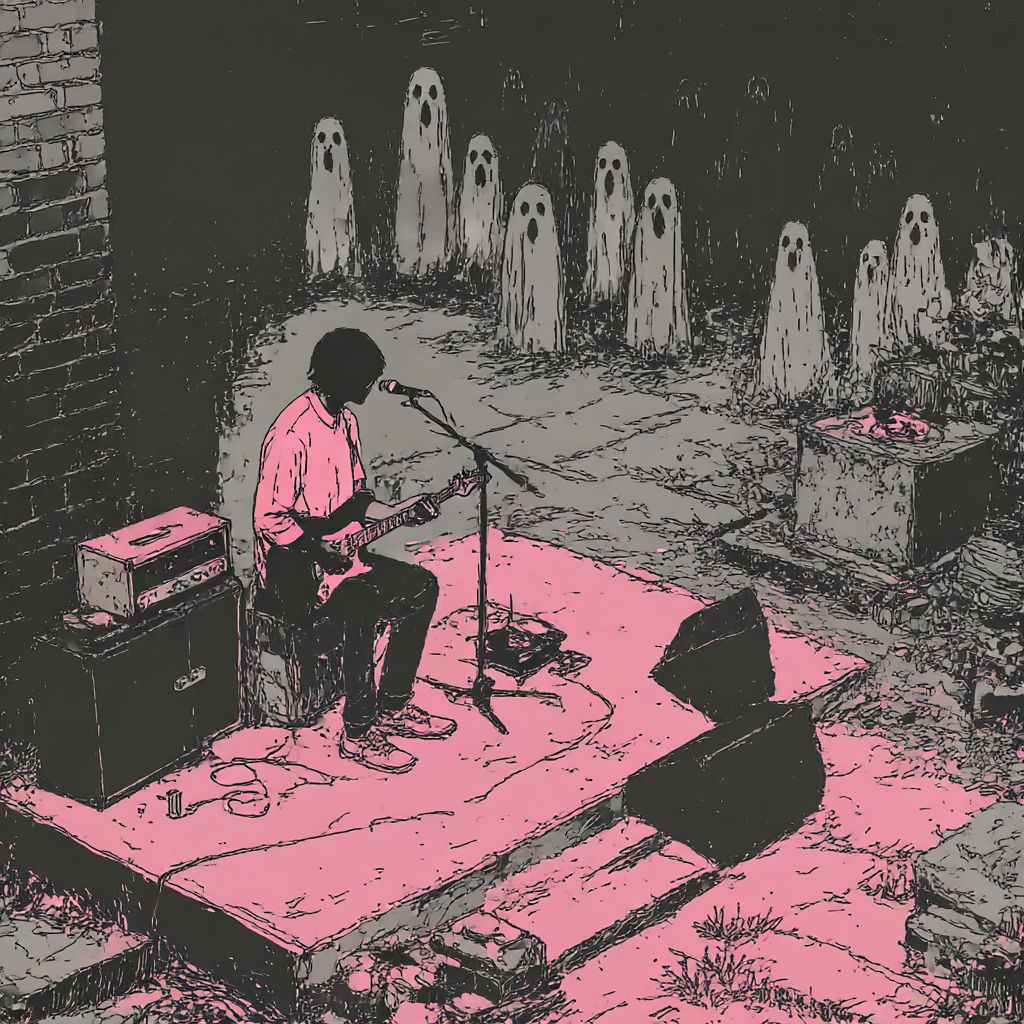Know Your Scene - Stop Posting to Ghosts
Achieve More With Limited Resources: 15 Small Budget Success Stories
Strategic marketing doesn't require enterprise-level spending. Our latest case studies reveal how 15 small brands achieved remarkable outcomes through creativity and smart resource allocation.
Innovative tactics that delivered exceptional ROI with minimal investment
Strategic approaches that helped small teams compete against industry giants
Data-driven techniques for maximizing impact when resources are limited
Looking for ways to stretch your marketing budget further? These 15 mini case studies show exactly how these small brands made such big waves without breaking the bank.
This is Vibrant Revolt, music’s sharpest edge — cut through the noise, avoid the pitfalls, and leave your legacy. Brought to you from the folks at:
// The Word This Week
Hey there, digital ghost whisperer,
Last week we talked about content pillars and hooks that actually convert. Good stuff. Pat yourself on the back. Have a cookie. My wife and kid baked them. They’re always baking…
But here's the uncomfortable truth that'll make you squirm: you're probably creating content for people who don't exist.
"But Laaaaaance," you say, "I know my audience! They are people who like music!"
Slow clap. Revolutionary insight. Really cracked the code.
Thing is, babe, we gotta get a little more specific than "humans with functioning eardrums."
Today we're fixing your audience problem once and for all.
Because posting great content to the wrong people is like playing a killer set to an empty room.
Technically impressive.
Emotionally devastating.
Financially ruinous (not to mention a pretty big bummer if you have a tenuous sense of self worth like yours truly).
Why Your "Broad Appeal" Strategy Is Actually Killing You
Let me guess your current audience research process:
Made some music
Posted about said music
Hoped "music lovers" would magically find it
Got confused when only your mom liked it
Sound familiar? Of course it does.
Here's what I’ve been screaming about for years: Your audience isn't "people who like music." Your audience is people who need YOUR specific type of music for SPECIFIC reasons at SPECIFIC moments in their lives.
And in 2024, this has become even more critical. Independent artists now command 36% of market share. Take this in: that’s more than Universal Music Group's 29%.
But how?
Well, in part, the artists winning are the ones going hyper-specific, not broad.
The Niche-First Revolution (And Why It Actually Works)
Every successful independent artist follows the same pattern:
Start tiny.
Dominate that tiny space.
Expand slowly.
Matt Bacon calls it the "Draw 50 people at home, sell 100 CDs" philosophy. Before you roll your eyes about CDs, understand the principle: become the biggest band in your specific micro-scene before attempting world domination.
Why does this work when "broad appeal" fails?
Algorithms favour engagement over reach. A post that gets 20 shares from passionate metalcore kids will get pushed to more metalcore kids. A post that gets 200 generic likes from "music lovers" gets buried.
Word-of-mouth works in niches. Passionate communities talk. They recommend. They evangelize. Generic audiences scroll and forget.
Competition is lower. Instead of competing with every musician on Earth, you're competing with the handful making music for your specific tribe.
How to Actually Find Your Micro-Scene (Without Losing Your Mind)
Forget demographics. Age and location are data points. What matters is psychographics, something me and the team here at V13 Promo spend a hell of a lot of time and energy in researching. At its barest bones, it means the emotional and cultural DNA of your scene.
Step 1: The Similar Artist Deep Dive
Find 4-5 artists your fans also listen to. Not just "similar sounding"—artists your actual listeners cross-reference (or could).
Your research targets:
One smaller artist (under 10k followers)
One medium artist (10k-100k followers)
One bigger artist (100k+ followers)
One local/regional act
One non-local act
Set up Google Alerts for all five. Watch where they get coverage. See who comments on their posts. Study their fan interactions.
This isn't stalking. This is market research.
Step 2: The Reddit Anthropology Project
Reddit is where your people talk unfiltered. Find the subreddits where your music lives:
r/indieheads (not r/Music—too broad)
r/trapproduction (not r/hiphop—too generic)
r/shoegaze (not r/alternative—too vague)
r/folkpunk (not r/folk—you get the idea)
Spend 30 minutes reading. Don't post. Don't promote. Just observe.
What are people arguing about?
What do they love obsessively?
What do they hate with passion?
What memes do they share?
How do they talk to each other?
This is your cultural playbook.
Step 3: The Discord Detective Work
Discord is where the most passionate communities live. Join servers related to your genre. Lurk first. Learn the culture.
What to look for:
How do members support each other?
What kind of music gets the most reaction?
What topics generate the most discussion?
Who are the community leaders?
Pro tip: Look for servers with 500-5000 members. Big enough to be active, small enough to build real relationships.
Building Your Hyper-Specific Fan Avatar
Now we get surgical. Create a detailed profile that goes way beyond age and location:
The Emotional Landscape
What keeps them up at 2 AM scrolling?
What makes them feel understood?
What are they nostalgic for?
What are they anxious about?
What values drive their decisions?
The Cultural Markers
What shows do they binge-watch?
What brands do they buy (or boycott)?
What other musicians do they worship?
What social causes do they support?
What memes make them laugh?
The Music-Specific Details
When do they listen to your type of music?
What emotions are they seeking?
What are they trying to escape or embrace?
How do they discover new music?
Your Local Scene Strategy (Even If You Think It Doesn't Exist)
🎷 If you have a local scene:
Become the person who helps. Offer to help bands load gear; let touring acts sleep on your couch; document shows; share opportunities.
To be clear, the goal isn't self-promotion here, it’s becoming indispensable.
💀 If your local scene is dead:
Time to CPR that corpse back to life.
Start with one other band. Just one.
Organize simple shows at unconventional venues
Document everything on social media
Partner with local businesses for sponsorship
Create online communities that can eventually meet in person
🕳 If no scene exists:
Create a digital-first community and import the energy.
Host virtual listening parties.
Create region-specific Discord servers.
Connect with artists in similar-sized towns facing the same challenges.
The Content Intersection Strategy That Actually Converts
Your content should live at the intersection of three things:
What you authentically care about
What your micro-community obsesses over
What's currently trending in your niche
Hit all three? That's the content that gets shared.
Miss any one? That's content that gets ignored.
Example Intersections:
Emo/Post-Hardcore Artist:
You care about: mental health awareness
Your scene cares about: authenticity and emotional vulnerability
Current trend: therapy-speak in lyrics
Content idea: "Breaking down the psychology behind my most honest lyrics"
Lo-fi Hip-Hop Producer:
You care about: vintage sampling techniques
Your scene cares about: study/chill aesthetics
Current trend: AI music production tools
Content idea: "Creating nostalgic beats using AI to recreate vintage samples"
Platform-Specific Micro-Community Building
Discord: The Intimate Fan Relationship Platform
Discord isn't just for gamers anymore. Artists like Disclosure and Fred Again use it as their primary fan communication tool.
Your Discord strategy:
Create channels for different types of interaction
Host weekly listening parties for new music
Share production tips and behind-the-scenes content
Maintain a "friends hanging out" vibe, not a broadcast channel
Visit daily for 30-60 minutes to keep community alive
Reddit: The Unfiltered Community Research Lab
The 80/20 rule: 80% valuable content, 20% self-promotion
Share production insights and techniques
Ask for specific feedback on works-in-progress
Discuss industry trends and challenges
Answer questions from newer artists
Build karma and credibility before any promotion
TikTok: The Niche Discovery Engine
TikTok's algorithm is designed for niche content to find its audience. In 2024, 13 of 16 number-one hits were TikTok-driven.
Create content that speaks to your specific community's interests
Use niche hashtags that your people actually search
Participate in trends but add your unique spin
Post 3+ times weekly for algorithm favor
The Audience Research Toolkit You Can Actually Use
Free Tools That Matter:
Google Alerts: Track mentions of similar artists
Reddit search: Find discussions about your genre
Spotify for Artists: Analyze your current listener data
Instagram Insights: See what content performs best
Discord server search: Find active music communities
Weekly Research Routine (20 minutes max):
Monday: Check Google Alerts for your tracked artists
Wednesday: Browse relevant subreddits for new discussions
Friday: Analyze which of your posts performed best and why
Sunday: Look for new Discord servers or online communities
✅ Tired of researching? Want someone to do the heavy lifting?
→ Book a free strategy call and let’s figure out how to grow your audience — the right way.
Red Flags: When You're Talking to Ghosts
You know you have an audience problem when:
Engagement rate consistently under 2%
Comments are generic ("fire track!" "cool beat!")
Your follower count grows but streams stay flat
No one organically shares your content
Your "fans" don't interact with each other
These are symptoms of posting to the wrong people or posting generic content to the right people.
The Micro-Scene Domination Action Plan
This Week:
Identify 5 similar artists
Join 3 relevant subreddits and Discord servers
Create your detailed fan avatar
Next Week:
Start your weekly research routine
Test content at the intersection of your interests and theirs
Engage authentically in your chosen communities
Month One Goal: Build genuine relationships in 2-3 micro-communities before promoting anything
Why This Matters More Than Ever
In 2024, 80% of artists earning over $1M on Spotify didn't have songs in the Global Daily Top 50.
Translation: You can build a sustainable career without mainstream success. But only if you dominate your niche first.
The artists winning right now aren't the ones trying to appeal to everyone. They're the ones who found their specific tribe and became indispensable to them.
Your music isn't for everyone.
And that's exactly why it will matter to someone.
Next Issue Preview
Next week: Content Creation Systems — the 1-5-10 method that turns one song into 50 pieces of targeted content without burning out your creative brain.
Until then, stop posting to imaginary people. Go find your actual humans.
They're out there, wondering where you are,
Lance
P.S. If you're still posting "new music out now!" without understanding who should care or why, please stop. Your scene’s embarrassed for you.
If you want to join our community and learn from us in real-time, check out our V1LLAG3 Discord server. Ask questions about music, the industry, promotion, and anything else your heart desires.




